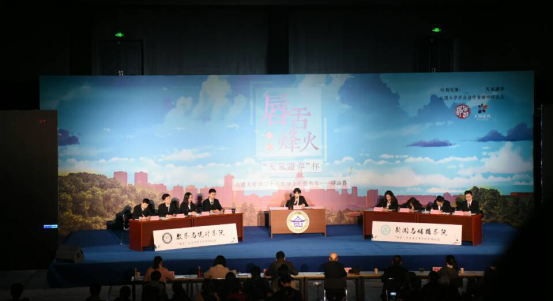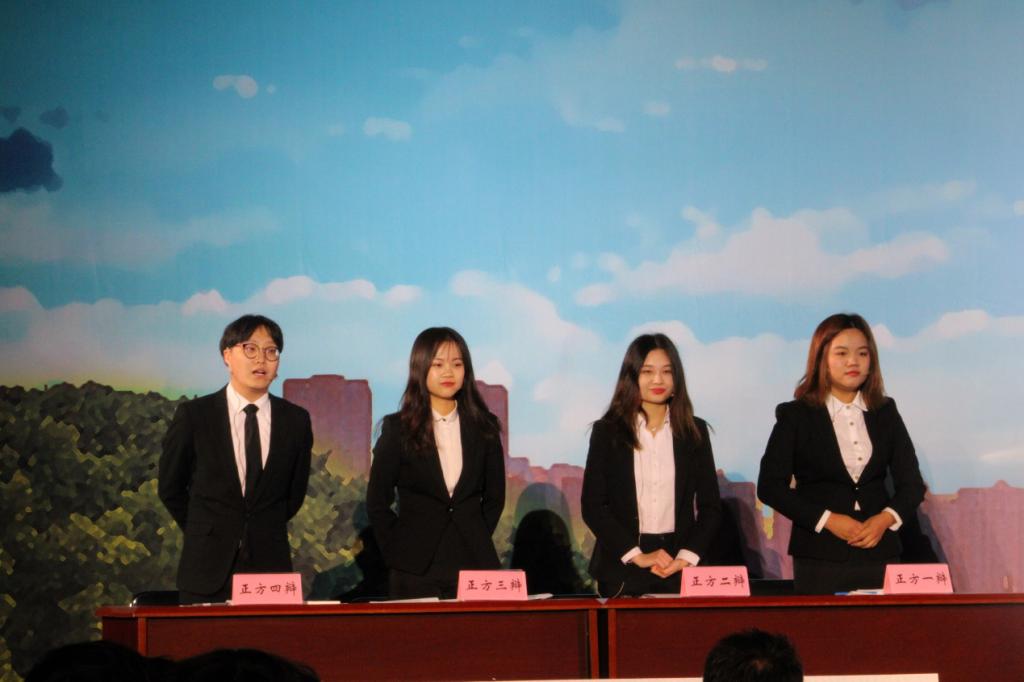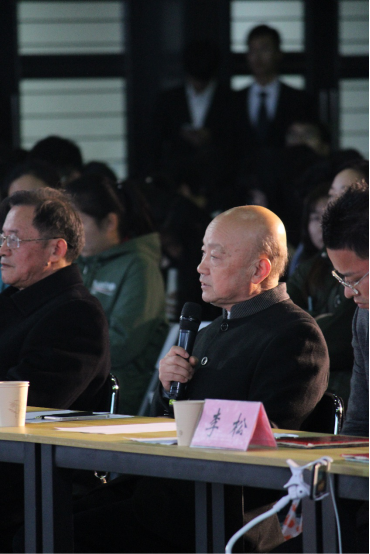Evening on November 17th, the Golden Autumn “War of Words” Debate Competition was held in the stadium of the school of Engineering. This year, the last winner was the team from School of Mathematics and Statistics. It is a hard-fought victory after five rounds of contests with a total of 31 teams participating from the beginning.

The final of the 30th Golden Autumn Debate Competition
The final for Bronze medal first took place between School of Political Science and Public Administration (Pro) and School of Civil Engineering (Con). They argued over the topic: In the era of big data, making full use of personal information or protecting personal information security, which should be encouraged?
Debaters from School of Political Science and Public Administration alleged that through utilizing personal information, companies can earn more profits, hence they will increase their willingness to make investments in defending information security. On the contrary, blindly stressing information security is unrealistic, as various standards are applied in different industries. The key to the question is to choose an approach that will lead to a win-win situation. The objection raised by School of Civil Engineering is that how can we ensure that companies will invest in personal information protection after they gain profits? They held the view that it is critical for citizens to guard their own privacy. Their idea was, which option is more preferable depends on the social developments, as well as the assessment on which calls for extrinsic impetus. as people have limited capacity of preserving their own information, it requires more attention to be paid on the issue.

Debaters from School of Political science and Public Administration
Discreetly evaluated, School of Political Science and Public Administration won the debate with a 4:3 vote at last. Li song, a teacher from College of Chinese Language and Literature, pointed out that when the pro side referred to the subject of utilizing personal information, it should not only include enterprises; while for the con side, preservation of private data is a legal issue and the economic advantage is not compatible with people’s security when it comes to value, so, it is not sensible for the con side to ignore these powerful points.
Then came the most eagerly awaited moment—the championship between School of Mathematics and Statistics and School of Journalism and Communication. Circling around the topic: whether Buddhist-style (an Internet buzzword, originated from a Japanese magazine in 2014) is the path to happiness for contemporary youth. They firstly gave different definitions of this word. The pro side identified “Buddhist style” as no anxiety, no stubbornness and no obligation. They deemed it a way to help young people relieve pressure. Besides, they believed that youngsters could benefit from this life attitude. By reflecting on the meaning of “happiness” pre-defined in accordance with society standards, such as, making money to afford a house or getting a foothold in big cities, they would be able to pursue their happiness more freely. The opposition side illustrated their ideas that “Buddhist-style” shows lack of purpose and fulfillment, as well as indifference to external affairs. Youngsters will not harvest happiness if they adopt a “Buddhist-style” life attitude due to the fact that they cannot realize their own value. It is unimaginable for either themselves or the society, on which a loss of motivation will have adverse effects.

Debaters from School of journalism and Communication
School of Mathematics and Statistics rebutted School of Journalism Communication by objection to equating “Buddhist-style” to living without an aim. “Strictly speaking, no one can live without any desire,”said by Luo Guanhua, the fourth debater of the pro side. He redefined “Buddhist-style” as not attempting to achieve happiness by force and trying to live with a more easygoing demeanor. He took Li Jian, a famous singer, who is also recognized as a “Buddhist-style” artist as an example and explained that it is his neglect of fame and money that gets him to realize peacefulness and serenity. Wang Haoran, the third debater of con side disapproved of this explanation and countered, “Is it possible that the things a person does not care about can bring him happiness? We believe that the happiness of Li Jian is derived from his perseverance in music rather than his ‘Buddhist-style’ to fame and gain.” The pro side responded, “it seems not fair to say that keeping at something someone likes is a happiness but giving up something else is not. People acquire inner peace when they are cool with the fact that they cannot have everything, which we believe, is a positive attitude that will also lead them to happiness.” These quick-witted words and persuasive statements triggered enthusiastic applause instantly.
Finally, School of Mathematics and Statistics won at 5:2 for “grasping a more academic and inclusive perspective”, according to Li Song. It was a fairly intense contest. The two teams questioned the interpretation of “Buddhist-style” put forward by each other, pointed out defaults in the opponent’s arguments and proposed their own in response to the other’ s views. Zhang Zhangran, a master of debate from School of Philosophy, analyzed that the resolution comes down to whether happiness is Monism or Pluralism and suggested the opposition side construe “happiness” as a whole. Having a positive attitude is an important element of happiness, but one’s family and responsibility to society, etc. are constituents of happiness as well.

Professor Zhang Zhangran from the School of Philosophy
Debating is an art of language, as well as an explosion of opinions. In such limited time, debaters’ keen reaction, deliberate thinking and broad knowledge can be exhibited, but we may not be aware of how much work has been done offstage. To build an exceptional debate team is a lengthy process which requires sustained efforts, and “it takes not a week, five weeks or a semester, but twenty years of love for debate and accumulation of efforts.” said Qu Xiangyu, the third debater of School of Mathematics and Statistics. When a debater takes the honor, he knows it never belongs to himself alone but everyone in his team. Luo Guanhua, who was awarded the best debater of the competition, described his feeling, “as a debater, I have said too much, but at this moment, only silence could express my happiness.”

The champion: Team from School of Mathematics and Statistics
Edited by Wei Yena,Wang Wei & Hu Sijia
Photo by: Study Department, Student Union of Wuhan Universit